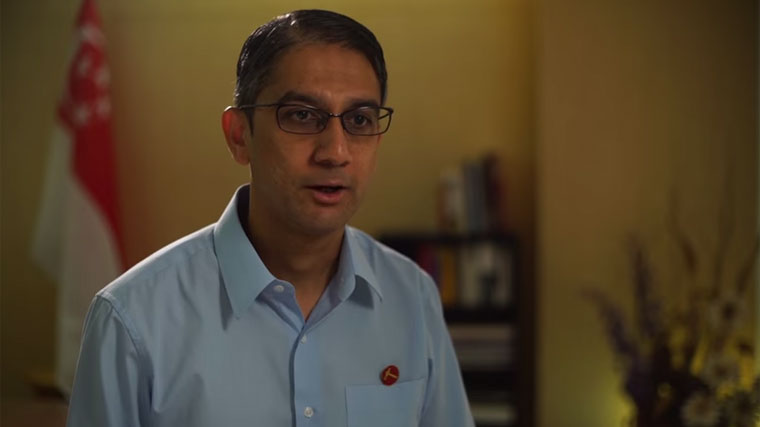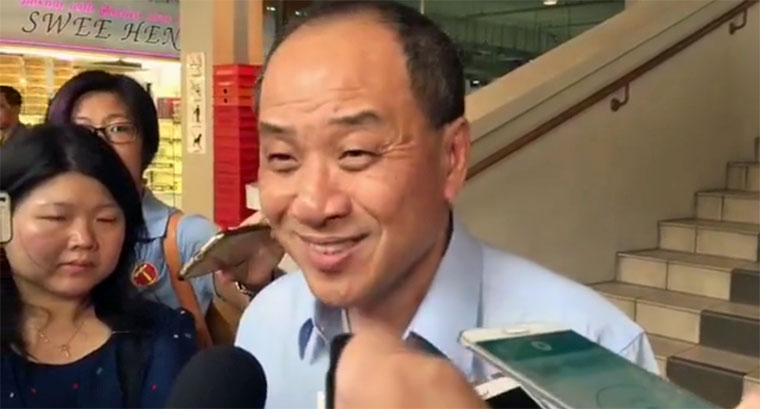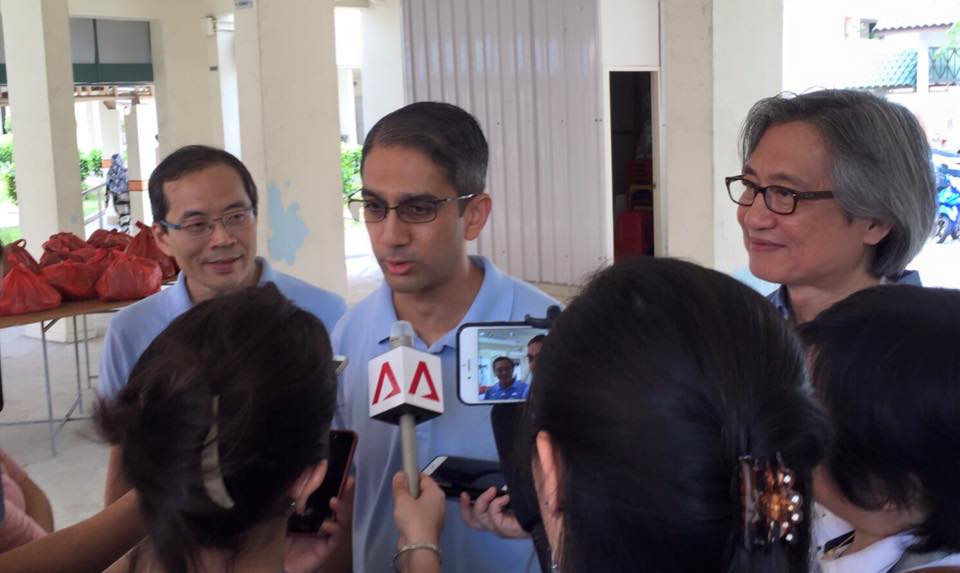Some of us may be aware of the recent news coverage of the exchanges between the government and Workers' Party (WP).
And nope, it is not about the Aljunied-Hougang-Punggol East (AHPETC) town council issue.
Basically, it concerns the Hepatitis C outbreak at the Singapore General Hospital (SGH). The Ministry of Health (MOH) has convened an independent Review Committee to investigate the cause of the outbreak and to look into how processes can be improved, both at the hospital and the ministry. This review was subsequently strengthened to include international experts.
There were several questions asked about MOH and SGH's handling of the incident. As Singapore's main opposition party, the Workers' Party (WP) decided to ask more questions, specifically on the Hep C independent review committee.
Here are five things we have learnt from the exchanges between the Government and WP on the Hep C review:
1. Leon Perera has a head start among the new MPs in terms of prominence
 Screenshot from video
Screenshot from video
Besides the newly-appointed ministers, many Singaporeans are probably not familiar with the newly elected PAP Members of Parliament (MPs) following the General Election (GE).
This is especially so since the election of the Speaker and the swearing-in of the MPs will only take place on Jan 15.
Perera, the Non-constituency MP-elect (NCMP) was in the spotlight several times last week because of his comments on the Hep C review.
On Oct 25, Perera cited previous Committee of Inquiry (COI) examples — MRT breakdowns in 2011 and the Little India riot in 2013 – and called for the review committee to be reconstituted as a COI.
A day later (Oct 26), he deemed the MOH Press Secretary's response calling on WP to lead evidence before the COI to be "inappropriate" as WP "does not have inquisitorial or investigative powers to marshal evidence through subpoenas of records and witnesses".
Last weekend (Oct 31), Perera continued his call for a COI, adding that reconstituting the current committee as a COI would create a more timely and efficient one-step process that will "strengthen public confidence in our healthcare system, not undermine it".
" width="560" height="315" frameborder="0" allowfullscreen="allowfullscreen">
A sign of things to come when Parliament convenes next year, we do think.
2. WP's persistence and political influence paid off
Health Minister Gan Kim Yong said on Oct 31 that Singaporeans should wait for the outcome of the review before deciding on further steps to be taken.
According to The Straits Times, Minister Gan "made these comments when asked by reporters about the Workers' Party repeating its call for the review committee to be reconstituted into a Committee of Inquiry (COI)".
In other words, WP's persistence on the issue paid off.
While WP did not obtain a straight reply from the government on the COI, Health Minister Gan at least responded to WP on why further steps should be taken only after the review.
Compare this to the Singapore Democratic Party (SDP)'s responses to the Hep C issue. The SDP called for the release of emails regarding Hep C outbreak and was, unfortunately, completely ignored by the government.
As'>
Posted by Singapore Democratic Party (SDP) on Wednesday, October 21, 2015
Guess it does matter for the Opposition to have several seats in Parliament.
3. The politics of impatience
When the Hep C cluster was first announced on Oct 6, MOH told the public that the review committee will complete its work in about two months’ time.
It's been less than a month since the committee was appointed. The public, including our opposition politicians, needs to be more reasonable with their demands for answers and quick solutions. Yes, there was a huge delay, but that ship has sailed — the committee now needs time to conduct a comprehensive investigation and "after-action" review.
In the 24/7 news cycle, it is easy for everyone (Mothership.sg included) to raise questions and engage in finger-pointing. But the hard work lies with the seven members of the review committee who have two months to perform the following tasks:
a) To provide an independent, objective and critical review of SGH’s report, and seek to ascertain if all possible measures had been taken to:
i. Identify the possible points of infection control breach;
ii. Remedy any weak points in the overall workflow particularly with regard to infection control;
b) To reasonably investigate any activity within its terms of reference, which will include but is not limited to the following:
i. Review the work and findings of the two Committees convened by SGH to investigate this Cluster (i.e. the Medical Review Committee and Quality Assurance Review Committee)
ii. Interview any staff member to clarify issues; and
iii. Perform site inspections at SGH.
The above were recently expanded to include purview over the Ministry's actions as well.
Let's use the Little India Riot COI as a point of reference: it took the committee nearly six months to submit their report (June 27) to Deputy Prime Minister Teo Chee Hean after they were convened on Dec 13, 2013.
Two months to conduct a review is reasonable. Let's give the committee some breathing space.
4. The defensive tone in the responses offered by the government
It is important for the government to shield the review committee from the public demand for quick answers so that the review committee is given ample time to conduct a fair and neutral review.
However, some of the responses by the Press Secretary to Health Minister to uncomfortable questions are perceived by some to be rather defensive.
Here are two examples:
Example 1: When Straits Times journalist Rachel Chang raised questions about the Hep C timeline provided by MOH, the Press Secretary to Health Minister instead questioned the "baseless allegations of political motive" by civil servants.
In other words, MOH did not engage Chang's observations that the MOH Hep C timeline raises questions in terms of the proper flow of information to MOH, the Minister, and the public.
Example 2: On WP's call for a COI, Press Secretary to Health Minister told the media on Oct 25 that the government will convene "a COI provided the WP is prepared to lead evidence before the COI, to substantiate whatever allegations it might have".
In other words, MOH did not engage with WP's reasons for reconstituting the current review committee as a COI and decided to put the ball in WP's court instead. So this becomes a staring contest between the government and WP — the COI will only be constituted if WP is willing to lead in providing evidence.
5. On scoring political points
 Screenshot from video
Screenshot from video
During the GE 2015 campaign, WP chief Low Thia Khiang told Lianhe Zaobao how he felt when people accused him of scoring political points.
In the Lianhe Zaobao exclusive, he said,
“It will be a failure for the People’s Action Party (PAP) if it does not know how to score political points. How does PAP govern? If it does not score points from politics, how does it govern? If PAP is unable to score points from politics, it means that it is cheating, don’t you think? This means that it is using underhanded means and does not need to score political points to govern.
First of all, if you are a politician, you must have the political acumen to score political points. PAP’s way of accusing opposition parties of scoring political points is a childish way of politics.
However, every politician needs to be responsible. The change in policies will affect people’s lives. You cannot just say populist things to score political points or raise populist subjects…We also have to think about the long-term future of the country”.
WP has been able to score "political points" by providing suggestions on how they think the review committee could be improved, namely the reconstituting of the current review committee as a COI.
However, the last two responses on Oct 26 and Oct 31 by Perera is the reiteration of the same point — the government has not engaged with WP on the case for a COI.
As Low said, "every politician needs to be responsible". The Health Minister has made the judgement call to conduct a review first, before considering other options. We should respect his decision to do so.
And we hear you, WP. The government did not engage WP on the case for a COI.
Let's hope the WP will not overreach in its political point-scoring by repeating the same arguments over and over again.
Top photo from Workers Party Facebook.
If you like what you read, follow us on Facebook and Twitter to get the latest updates.
